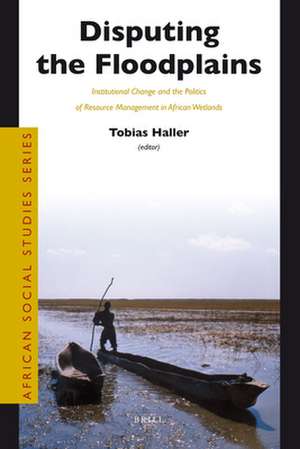Disputing the Floodplains: Institutional Change and the Politics of Resource Management in African Wetlands: African Social Studies Series, cartea 22
Editat de Tobias Halleren Limba Engleză Paperback – 11 iul 2010
With a foreword by Elinor Ostrom.
This book has received the Environmental Research Award 2011 of the University of Bern, Switzerland.
Din seria African Social Studies Series
- 15%
 Preț: 400.26 lei
Preț: 400.26 lei - 15%
 Preț: 421.76 lei
Preț: 421.76 lei - 15%
 Preț: 521.68 lei
Preț: 521.68 lei - 15%
 Preț: 395.90 lei
Preț: 395.90 lei - 18%
 Preț: 558.05 lei
Preț: 558.05 lei - 15%
 Preț: 397.83 lei
Preț: 397.83 lei - 15%
 Preț: 398.74 lei
Preț: 398.74 lei - 15%
 Preț: 398.33 lei
Preț: 398.33 lei - 15%
 Preț: 398.48 lei
Preț: 398.48 lei - 15%
 Preț: 398.00 lei
Preț: 398.00 lei - 15%
 Preț: 399.69 lei
Preț: 399.69 lei - 15%
 Preț: 400.90 lei
Preț: 400.90 lei - 38%
 Preț: 398.48 lei
Preț: 398.48 lei - 15%
 Preț: 395.83 lei
Preț: 395.83 lei - 15%
 Preț: 397.68 lei
Preț: 397.68 lei - 15%
 Preț: 400.09 lei
Preț: 400.09 lei - 15%
 Preț: 395.68 lei
Preț: 395.68 lei - 15%
 Preț: 397.68 lei
Preț: 397.68 lei - 15%
 Preț: 400.50 lei
Preț: 400.50 lei - 15%
 Preț: 396.88 lei
Preț: 396.88 lei - 15%
 Preț: 399.69 lei
Preț: 399.69 lei - 15%
 Preț: 397.36 lei
Preț: 397.36 lei - 15%
 Preț: 402.52 lei
Preț: 402.52 lei - 15%
 Preț: 399.28 lei
Preț: 399.28 lei - 15%
 Preț: 400.50 lei
Preț: 400.50 lei - 15%
 Preț: 393.65 lei
Preț: 393.65 lei - 15%
 Preț: 369.64 lei
Preț: 369.64 lei - 15%
 Preț: 397.68 lei
Preț: 397.68 lei - 15%
 Preț: 369.86 lei
Preț: 369.86 lei - 15%
 Preț: 363.98 lei
Preț: 363.98 lei - 15%
 Preț: 397.36 lei
Preț: 397.36 lei - 15%
 Preț: 368.51 lei
Preț: 368.51 lei - 15%
 Preț: 368.51 lei
Preț: 368.51 lei - 15%
 Preț: 396.06 lei
Preț: 396.06 lei - 15%
 Preț: 414.62 lei
Preț: 414.62 lei - 15%
 Preț: 394.14 lei
Preț: 394.14 lei -
 Preț: 365.91 lei
Preț: 365.91 lei - 15%
 Preț: 394.71 lei
Preț: 394.71 lei - 15%
 Preț: 445.38 lei
Preț: 445.38 lei - 15%
 Preț: 396.38 lei
Preț: 396.38 lei - 15%
 Preț: 403.98 lei
Preț: 403.98 lei - 15%
 Preț: 397.68 lei
Preț: 397.68 lei - 15%
 Preț: 401.39 lei
Preț: 401.39 lei - 15%
 Preț: 397.93 lei
Preț: 397.93 lei
Preț: 402.26 lei
Preț vechi: 473.25 lei
-15% Nou
Puncte Express: 603
Preț estimativ în valută:
76.97€ • 80.59$ • 63.84£
76.97€ • 80.59$ • 63.84£
Carte indisponibilă temporar
Doresc să fiu notificat când acest titlu va fi disponibil:
Se trimite...
Preluare comenzi: 021 569.72.76
Specificații
ISBN-13: 9789004185326
ISBN-10: 9004185321
Pagini: 452
Dimensiuni: 160 x 240 x 25 mm
Greutate: 0.76 kg
Editura: Brill
Colecția Brill
Seria African Social Studies Series
ISBN-10: 9004185321
Pagini: 452
Dimensiuni: 160 x 240 x 25 mm
Greutate: 0.76 kg
Editura: Brill
Colecția Brill
Seria African Social Studies Series
Recenzii
'Anthropologists and historians have written individual case studies that are of considerable value. Without serious efforts to compare historical case studies, however, it is difficult to obtain theoretical results that then can be tested by other scholars. The collection of papers in this book helps us understand resource management processes over time within multiple settings in five African countries. The focus is primarily on floodplain resources, but includes parallel resource problems related to fisheries and open pastures. Each of the chapters is well worth a serious read. Chapter Nine is a particularly valuable contribution to the study of institutional change. Haller provides an excellent synthesis of the work of the eight scholars who have contributed chapters in this book.'
Elinor Ostrom, Indiana University and Arizona State University
'This book is a useful addition to any African studies library because it lays out a rigorously detailed and persuasively argued model for environmental history and anthropology, [....] It is a very dry book about very wet places, but it establishes an analytical framework that will undoubtedly be useful for understanding the historical dynamics of African socialecological systems far beyond the wetlands'.
Michael Sheridan, Middlebury College
In: IJAHS Vol. 45, No. 1 (2012)
Elinor Ostrom, Indiana University and Arizona State University
'This book is a useful addition to any African studies library because it lays out a rigorously detailed and persuasively argued model for environmental history and anthropology, [....] It is a very dry book about very wet places, but it establishes an analytical framework that will undoubtedly be useful for understanding the historical dynamics of African socialecological systems far beyond the wetlands'.
Michael Sheridan, Middlebury College
In: IJAHS Vol. 45, No. 1 (2012)
Notă biografică
Tobias Haller, Ph.D. (2001) in Social Anthropology, University of Zürich, is Associate Professor at the Institute of Social Anthropology, University of Bern, Switzerland, He has done fieldwork in Cameroon and Zambia and supervised research in many other African Countries. He has published on environmental and resource management issues (commons, protected areas, indigenous peoples and oil exploitation) and New Institutionalism in Africa with a comparative focus on other continents. His publications include Fossile Resources, Indigenous Peoples and Oil Companies (Lit-Publishers, Hamburg, London 2007) and People, Protected Areas and Global Change (NCCR Bern, 2008) and papers in journals such as Human Ecology, Environment and Development, Human Organisation, African Anthropologist, Food Policy, Journal of International Development.
